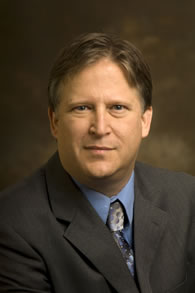News Release: Research, School of Medicine
Mar. 12, 2009
Emory Names Ethics Center Director Paul Root Wolpe to New Schinazi Chair in Jewish Bioethics
 Paul Root Wolpe, PhD
Paul Root Wolpe, PhDPaul Root Wolpe, PhD, director of the Emory Center for Ethics, has been appointed to the Raymond F. Schinazi Distinguished Research Chair in Jewish Bioethics. The appointment, in the Department of Pediatrics of Emory University School of Medicine, was effective Feb. 1, 2009.
The Raymond F. Schinazi Distinguished Research Chair in Jewish Bioethics honors Raymond F. Schinazi, PhD, DSc, professor of pediatrics at Emory and the Frances Winship Walters Chair in Pediatrics. The Chair reflects Schinazi’s longtime support of the Department of Pediatrics and his interest in Jewish studies. Schinazi, who graciously agreed to fund this new chair, is a co-inventor of several of the world’s most successful drugs used to fight HIV/AIDS infection.
Wolpe received his doctorate in medical sociology from Yale University in 1986. He was on the faculty at the University of Pennsylvania until his recruitment to Emory in 2008. In addition to his new appointment, Wolpe also is the Asa Griggs Candler Professor of Bioethics, professor of medicine in Emory University School of Medicine, professor in Emory’s Graduate Department of Religion and adjunct professor in the Emory College Department of Sociology.
"Once again we need to thank Dr. Schinazi for his support of the Department of Pediatrics, the School of Medicine and the University. With the creation of this new chair in Jewish bioethics, we are enhancing the relationship between the School of Medicine and Emory College and expanding the scholarly horizon of the Department of Pediatrics," says Barbara J. Stoll, MD, George W. Brumley Jr. Professor and Chair of the Department of Pediatrics in Emory School of Medicine. "We are extremely fortunate that Paul Wolpe, a nationally recognized intellectual leader in bioethics, will occupy this critical new position."
With an intellectual focus on the role of belief and ideology in medicine and science, Wolpe is considered a founder of the field of neuroethics. His article "Religious responses to neuroscientific questions," in the first edited book on neuroethics is, to date, considered the definitive article on the religious questions raised by advances in neuroscience. Wolpe writes prolifically on emerging technologies, such as genetic engineering, reproductive technologies, nanotechnology and prosthetics. His writings range across multiple fields of bioethics and sociology, including mental health and illness, death and dying, genetics and eugenics, gender, alternative medicine, and bioethics in extreme environments such as space.
A past president of the American Society for Bioethics and Humanities, the national professional organization for scholars in bioethics and the medical humanities, Wolpe also is a co-editor of the American Journal of Bioethics, the premier scholarly journal in Bioethics. He also serves on the editorial boards of more than a dozen professional journals in medicine and ethics. He is the bioethics consultant to the National Aeronautics and Space Administration (NASA), where he served as the agency’s first Chief of Bioethics from 2001 to 2007. Wolpe is one of the few non-physicians to be elected a Fellow of the College of Physicians of Philadelphia, the country’s oldest medical society, and is the first National Bioethics Advisor to the Planned Parenthood Association of America.
Wolpe comes from a rabbinic family and is very active in issues of Jewish bioethics. A conference he founded, Jewish Bioethics at the Crossroads, has evolved into the Academic Coalition for Jewish Bioethics, the only interdenominational organization and annual national conference on the topic. He has participated on working groups such as the Collaborative International Jewish Discourse on Genetics and is a founder and a former officer of the Society of Jewish Ethics. He has served on a large number of boards and advisory groups, including the Jewish Publication Society, the Health Sciences Committee of the American Associates for Ben-Gurion University, the Finkelstein Institute of the Jewish Theological Seminary, the Center for Jewish Ethics of the Reconstructionist Rabbinical College and the Metanexus Institute for Science and Religion.
He has delivered numerous distinguished lectures in Jewish and religious bioethics, such as the annual Isaac Franck Distinguished Memorial Lecture in Jewish bioethics at the Kennedy Institute of Ethics at Georgetown and the Louise Lauck Kingston Lecture on Spirituality and Health at Princeton. He has served as scholar-in-residence on Jewish bioethical issues for synagogues, hospitals and universities and has co-authored a guide to Jewish end-of-life issues titled Behoref Hayamim: In the Winter of Life.
###
The Robert W. Woodruff Health Sciences Center of Emory University is an academic health science and service center focused on missions of teaching, research, health care and public service. Its components include schools of medicine, nursing, and public health; Yerkes National Primate Research Center; the Emory Winship Cancer Institute; and Emory Healthcare, the largest, most comprehensive health system in Georgia. The Woodruff Health Sciences Center has a $2.3 billion budget, 17,000 employees, 2,300 full-time and 1,900 affiliated faculty, 4,300 students and trainees, and a $4.9 billion economic impact on metro Atlanta.
Learn more about Emory’s health sciences:
Blog: http://emoryhealthblog.com
Twitter: @emoryhealthsci
Web: http://emoryhealthsciences.org
